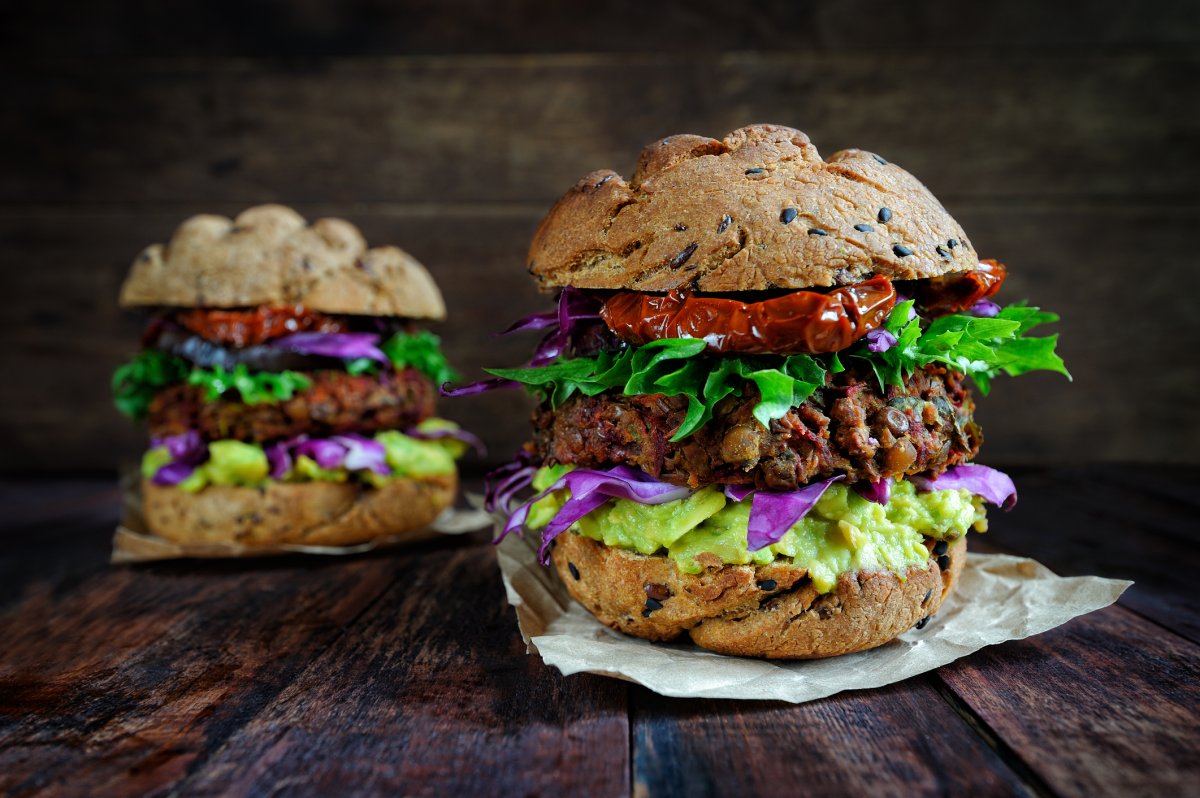There’s sometimes the assumption vegan and vegetarian food is automatically better for you because they don’t contain any meat.

But some experts say, most meats alternatives really aren’t healthy foods.
“They may be vegan, fortified with minerals or devoid of saturated fats or cholesterol, but they are also highly processed, full of salt and refined ingredients as opposed to whole foods,” says Desiree Nielsen, a registered dietitian based in Vancouver.
Los Angeles-based dietitian Vandana Sheth, says these “meat” products can help people transition into a vegetarian or vegan lifestyle (especially if they miss the texture of meat) but they shouldn’t be consumed daily.
“Many are just as high if not higher in fat, sodium and calories than the real thing,” she tells Global News.
READ MORE: The hottest trends in vegetarian food
Ingredients you should avoid
Dr. Pamela Fergusson, a plant-based dietitian and health expert in Toronto, says many highly processed meat alternatives are made with soy and gluten, as opposed to whole foods. Consumers should always read the ingredient list before purchasing.
“There is some variation and some of them are made with whole food ingredients and are high in protein and good sources of iron and zinc,” she tells Global News.

- N.S. mom calls for better ultrasound access after private clinic reveals twins
- As Canada’s tax deadline nears, what happens if you don’t file your return?
- 3 women diagnosed with HIV after ‘vampire facials’ at unlicensed U.S. spa
- Investing tax refunds is low priority for Canadians amid high cost of living: poll
Nielsen adds when you are reading packages, see if the ingredients are equivalent to a recipe you can make at home. “I typically avoid soy protein isolates, in addition to ensuring that the product is non-GMO because that is personally important to me.”
How much can you eat?
Again, not all products are made the same and in Canada, vegetarian and vegan “meats” come in all shapes and sizes. Sheth says vegetarian and vegan diets (like any diet) should include all types of food.
“Incorporate a variety of foods to adequately meet your nutritional needs such as whole grains, protein, colourful fruits and veggies, and heart-healthy fats from nuts and seeds.”
READ MORE: For the love of bacon: Vegetarians, don’t make your date quit meat
Depending on how the product is made, can determine how often you should eat it. Fergusson says choosing vegetarian burgers, for example, made with sweet potatoes, black beans and quinoa is healthier than something soy-based.
Neilsen agrees, adding you can also easily get away with using tofu or white beans to make burgers and portobello mushrooms are also quite popular.
“You can absolutely make veggie meats fit in a healthful diet but they shouldn’t be your mainstay. Two or maybe three times a week, in the context of an otherwise healthful, whole foods diet should be fine,” Neilsen says.
Products worth mentioning
Some of the most popular vegetarian and vegan meat brands in Canada include Yves Veggie Cuisine (which sells everything from deli slices to sausages to breakfast items), and Gardein (which sells everything from meatless pizza pockets to fish sticks to nuggets).
Nielsen recommends Big Mountain Foods, a Vancouver-based company that makes veggie burgers with beans and vegetables.
“In addition, their veggie ground is the best option I’ve seen as it is made from whole foods, with the addition of some pea protein — a non-allergenic option,” she says.
She is also a fan of tempeh “bacon” strips by Tofurky, because they are actual strips of tempeh, a fermented soybean cake.
Another healthier option is Montreal-based company Gusta Foods, specializing in high-protein sausages. These products are made with wheat gluten instead of soy protein isolates.
“Wheat gluten may seem like an odd ingredient, but it is quite natural and has been used in Asian-style dishes for ages.”
Fergusson, on the other hand, recommends SOL Cuisine, a Mississauga, Ont.-based company that has a quinoa chia burger, and kale and root vegetable patties by Yves Veggie Cuisine.
Getting enough protein
And if protein is the issue, experts argue there are all kinds of sources that don’t involve any type of meat alternative.
Vegetarians and vegans should be eating lentils, hummus, nuts and seeds and whole grain foods, Fergusson says.
READ MORE: Paleo diet or vegetarian: which is better for your health?
“Hemp seeds always surprise people … three tablespoons has about 10 grams of protein,” Neilsen adds. “It’s so easy to add hemp seeds to smoothies, oatmeal or even just sprinkle them on salads.”
And while beans may be one of the best sources of protein for any diet, they tend to be undereaten, she adds. “If you add a concentrated source of protein like tofu, beans or a high protein nut/seed, whole grains and other plant foods … it will get you topped up.”





Comments